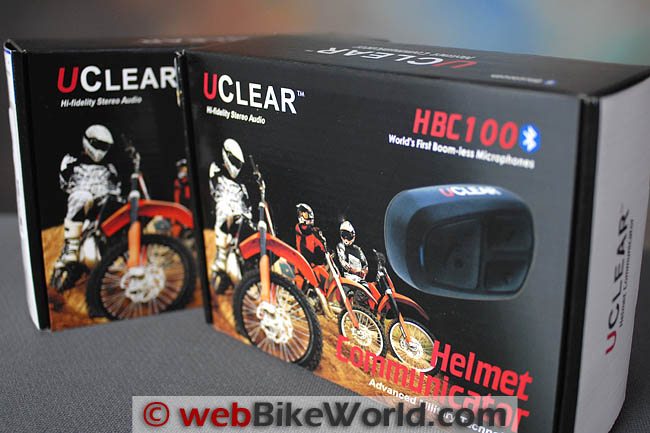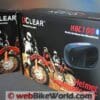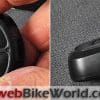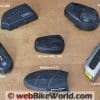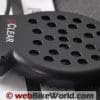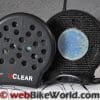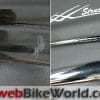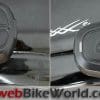The UClear HBC100 is a new system that successfully utilizes proven technology packaged in a very small form factor for efficiency, portability and versatility.
The HBC100 intercom performance borders on spectacular with audio output on par with the best helmet systems we have evaluated to date.
The system doesn’t have all the “bells and whistles” found on some systems, but then that wasn’t the design intent.
With a couple of minor tweaks and improved support for navigation devices, the UClear HBC100 could be our next winner.
What? A leading-edge Bluetooth helmet communications system named after me!
Well, not really, but when the Editor sent me the link for the UClear HBC100, I just had to check it out.
The parent company, BITwave (Singapore), has a long history of research, development and implementation of leading edge audio products, particularly for military applications.
Much of the technology they manufacture focuses on the use of low-profile devices for fitment into or wearing on almost any type of garment, while still providing excellent audio output and input.
While the form factor of an intercom system is important, it is the audio technology that really makes these products so effective.
The HBC100 incorporates various techniques and technologies, which were developed for use in extremely noisy communications environments, including the battlefield.
These include noise suppression algorithms and the most noticeable feature of the HBC100 system, the adaptive beam-forming microphones.
The microphones are built into the speakers, eliminating the need for a separate boom or wired microphone.
This adds a very interesting capability for a motorcycle intercom system, along with fewer mounting issues for various types of helmets.
UCLEAR Firmware Update Provides Compatibility With Other Brands
UPDATE (April 2, 2014. Press release edited by webBikeWorld.com) UClear announced a firmware upgrade for their intercoms that allows cross-brand interoperability with different brands of Bluetooth headsets.
The firmware update is available via a free download today on the UClear website.
Additional benefits of the firmware update include Multi-Point communications that allow a user to link their UClear intercom with a second Bluetooth device for increased versatility.
For example, a user can not only add a smartphone, but also a dedicated Bluetooth GPS device.
Introduction
These technologies are well proven, and UClear is a major player. UClear marketing claims that the HBC100, with its “patented Digital Signal Processing (DSP) technology, unique wind filtering technique and concealed microphones”, introduces “a whole new, game changing communication technology”.
The system integrates a number of advanced audio technologies and UClear claims that “the HBC100 offers the World’s First boom-less helmet communicator available on the market today”.
While I acknowledge that the HCB 100 system does not use a boom or even a thin wire microphone, technically it’s not the first such system.
Some years ago, I evaluated a system that incorporated a shell and bone conductance microphone for audio input and output, but it wasn’t very effective, at least in that implementation.
Nevertheless, the HBC100 is truly unique.
Its shape and form is largely a result of the company’s desire to provide something for those consumers who prefer not to install a boom or wired microphone and for helmets in which mounting a boom mic might be difficult or impossible.
But for now, the HBC100 truly is the only motorcycle Bluetooth helmet communications system that works without a boom or thin-wire microphone assembly.
The UClear HBC100 system has a few other unique features as well. The audio technology used in the HBC100 is a near-perfect solution for low-profile and non-intrusive installation requirements.
Having used or tested components that utilize this technology in the past I was curious to see how the UClear implementation would work…but more on that later.

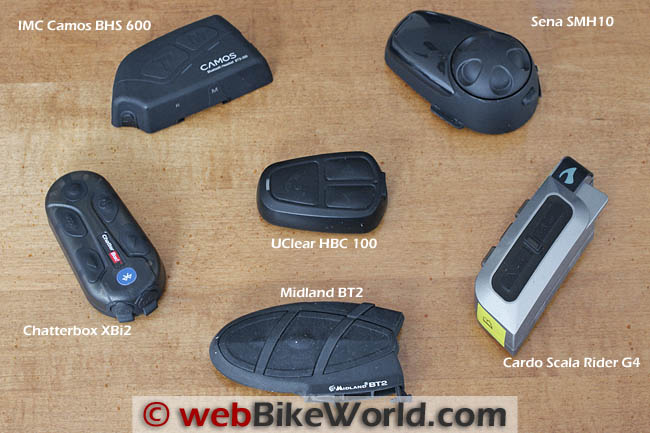
The UClear HBC100 Form Factor
The first really noticeable thing about the HBC100 is its size; absolutely tiny when compared to everything else in my current collection of over ten different Bluetooth helmet systems.
It’s easy to see why UClear touts the portability and versatility of the HBC100 system, given its size, component simplicity and mounting adapter.
Each UClear HBC100 kit contains the following:
- A weatherproof Bluetooth headset module or control unit;
- A stereo speaker set with embedded microphones and mini-USB plug connector;
- A metal spring clip for helmet attachment;
- AC-to-DC charging adapter with USB Type A to USB mini connectors;
- Mounting accessories;
- And a combination Quick User Guide/User Manual.
Easily fitting into the palm of the hand, the HBC100 Bluetooth module has smooth rounded edges and an easy-to-grip hard black finish.
The face of the Bluetooth module is dominated by three tactile controls: the “Answer” button occupies the front half with the “Up” and “Down” buttons occupying the back half of the surface.
A small multi-colour Status Indicator LED is positioned in front of the Answer button and serves as the visual interface with the system. The mini-USB port used to connect the headset lead or the charger is located on the back edge.
A removable flush mounted back panel with molded clip bracket is held in place with four small screws.
Two large diameter and relatively heavy speaker modules, with their integrated array microphones, have short (Left) and long (Right) leads terminating into a mini-USB plug.
Each housing has the standard “hook” backing to facilitate mounting in most helmets. If the “loop” backing is needed, two of these roundels are provided as part of the accessories.
Other accessory items included with the HBC100 kit include a small rubber anti-slip rubber pad, two paper-clip style spring handles, the AC-to-DC adapter with its USB charging lead and a user manual.
What immediately stands out is the absence of a boom or thin-wire microphone.
What doesn’t stand out are the two patented adaptive beam-forming microphones discretely embedded in the base section of each housing. I’m sure some consumers might actually think they are a secondary speaker of some sort.
Here are photos showing the unique UClear HBC100 speaker with the adaptive beam-forming microphones:
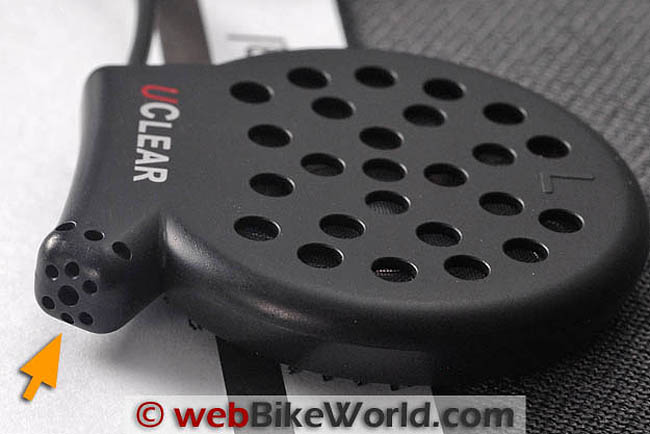
UClear HBC100 Technology
There is a lot of technology packed into the HBC100 Bluetooth module, both simple and complex, but it all works.
The UClear HBC100 system is different, and not just because it lacks a boom or thin-wire microphone hanging off the front inside of the helmet.
The patented “wear array” technology is intended to provide excellent speech quality even while on the move.
This is accomplished by adaptively enhancing the user’s speech while suppressing interference and environmental noises, like street, engine, wind and other speech or music that may be present.
And this is where the two-microphone array comes into play. It forms a “sweet spot zone” in front of the speaker’s mouth, and the result is that the person on the other end of the conversation hears absolutely clear audio.
Combining this array technology with “Hybrid Adaptive Beam-Forming” and “Interference Canceller Filters” further enhances the quality of the sound from the HBC100 system.
UClear states that these latter two technologies, along with the microphone array, are meant for high-mobility applications such as motorcycling. As a result, effective full duplex (two-way) voice communications are accomplished even under very noisy environmental conditions.
Having used this technology in the past in other communications systems, I can vouch for how effective it can be.
In essence, the more challenging the environment, the more the technology responds, with the system adapting to maintain the volume and quality of speech generated by the user.
The use of advanced algorithms to process high speed sampling of the environment results in very fast, very accurate and very effective suppression of background noise.
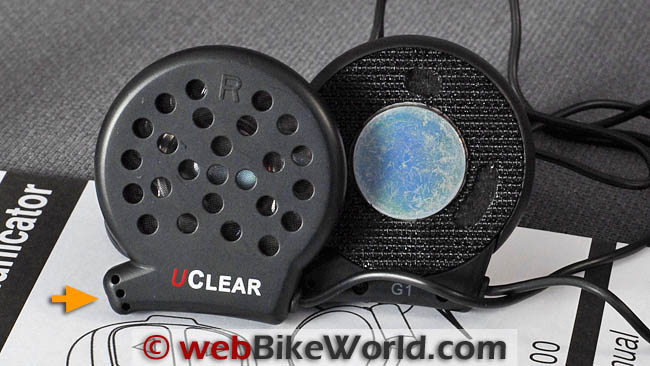
The UClear HBC100 Helmet Mounting Adapter
Simplicity, versatility and cost define the mounting solution provided with the HBC100 system.
A bull-dog style tensile metal clip bracket with guide slots for fitting the Bluetooth module is provided as the removable or portable helmet mounting option for the intercom module.
A double-sided adhesive bracket is also included, which provides a more permanent mounting option for hosting the small easily removable Bluetooth module.
As with most Bluetooth helmet communications systems, installation is not complicated and is governed by the type of helmet being used.
While correct speaker placement is always essential with a motorcycle helmet intercom system, it is a bit more critical for the HBC100 components given the need to install the left and right housings symmetrically inside the helmet, directly in line with and as close to the ears as possible.
This linearity provides the correct orientation and a balanced environment for the microphones that are embedded on the speakers.
Measuring 44 mm wide by 48 mm deep and 8.5 mm thick, the irregular shaped speaker housings with their embedded microphones are not round per se, but still small enough to fit in most helmets.
I’ve now installed and used the system on four different helmets, including the Arai Corsair (Arai Corsair V review) and three modular helmets: the SCHUBERTH C3 (review), the BMW System 6 and the Nolan N-103 (review).
The Arai, with its open cheek-pad recess, is easy to work with. The speaker housings can be moved up, down, backwards or forwards as needed to optimize placement vis-à-vis the ear.
I did, however, use a foam pad beneath the speakers to bring them closer to the ear.
The oval recesses in the SCHUBERTH C3 can accommodate each speaker assembly, but forward placement for alignment with my ears resulted in the protrusion that houses the microphone to sit out 2 mm to 3 mm on the edge of the liner. But with the plush liner snapped back into place I can’t feel anything.
The BMW System 6, with its larger shell and slightly larger oval recesses, fully accommodates the UClear speakers, as long as a set of foam pad spacers is used to move the speakers out slightly.
The deeper but smaller diameter speaker housings of the Nolan N-103 could have been an issue for the irregular shape of the HBC100 housings, but as I have already modified this helmet slightly for another intercom system, the HBC100 speaker housings basically just slipped in to place.
Some owners may not have to use the speaker recesses in the Nolan N-103, as the Nolan shell and liner combination typically provides a bit of clearance in this area.
The HBC100 module and bracket or module and adhesive mount combinations are so small that the assembly can be mounted almost anywhere on the helmet.
The only real limitations are to place it in an area that has ease of access and enough length for the connection lead.
I actually positioned the HBC100 about 25 mm or so closer to the front of the helmets than is typically allowed or viable with the much larger Sena SMH-10 (review) or Cardo Scala Rider G4 (review) mounting brackets.
Since the HBC100 module requires only a very small piece of real estate on the left side of the helmet, some very tidy and low profile installations can be considered.


Mounting the UClear HBC100 Intercom Module
To mount the clip bracket, the two spring handles are inserted into detents on either side of the bracket. Squeezing them opens the clip so it can slide up between inner liner and the outer shell.
The series of photos above illustrates this process.
Depending on lower shell curvature, the supplied soft rubber pad can be inserted between the clip and the outer helmet shell to protect surfaces and minimize slippage.
With the bracket fully pushed up into position, squeezing each spring clip inwards pulls them from their detents; they can be put aside until needed again for mounting on a different helmet.
In actuality, the bracket is not that strong and if one is careful, it can be forced apart and slid into place with one smooth motion…just don’t let it bite you.
If the adhesive mounting option is chosen, make sure the intercom module placement is correct. This should be marked first before peeling off the protective film and mounting the bracket.
As with most adhesive mounts, a few hours’ curing time is recommended.
This also lets the user assess how well the mount has adapted to its new home; some combinations of adhesive and shell materials just don’t adhere very well.
With either mounting bracket in place, the HBC100 module slides into place from the top using the guide rails. As it seats, it will click into place. To remove the module, hold the bracket and push firmly up on the module gently to release it.
Last step: Insert the mini-USB headset connector into the companion port on the back of the module and make sure it is fully seated; all three small raised ribs on the connector should disappear as the connector is inserted.
As designed, it is a tight fit — a direct push or pull is needed, but don’t wiggle it as this puts undue stress on the small connector components.
I make this last point for a reason — the pin separator inside the USB port on one of the HBC100 intercom modules came off and lodged itself in the headset connector, rendering one system unusable.
An email to the Editor resulted in a replacement unit being sent out by UClear and received within the week; good support so far and the replacement unit is holding up well.
Next: Part 2: Using the HBC100, Performance Observations and Conclusion
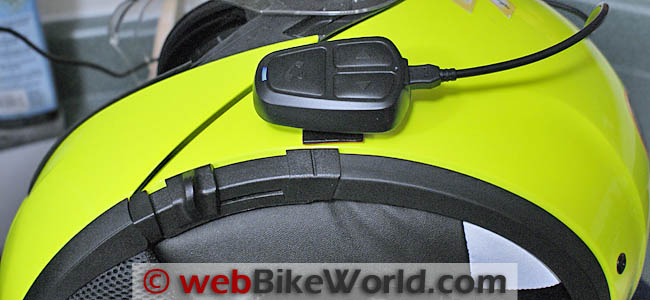
Part 2: Using the HBC100, Performance Observations and Conclusion
(Note: Owner Comments are located at the end of Part 2)
See Also: UClear HBC 200 Review | UClear WT300 Bluetooth Adapter Review


